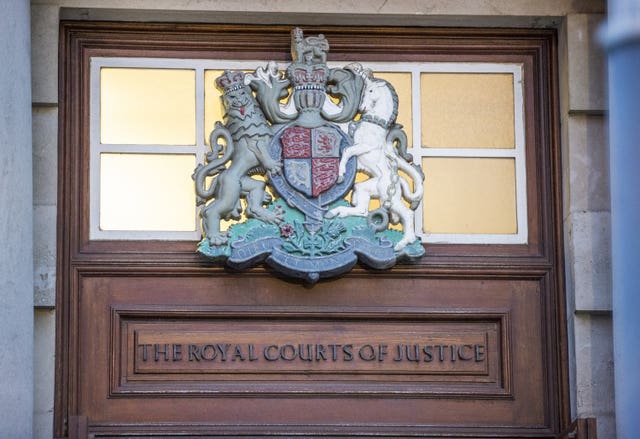
The Government’s controversial Legacy Act cannot “wipe away the tears” of suffering of Troubles victims in Northern Ireland, a court has been told.
Submissions in a legal challenge to the Northern Ireland Troubles (Legacy and Reconciliation) Act at Belfast High Court concluded on Thursday morning after eight days.
High Court judge Mr Justice Colton said it had not been an easy case and pledged to deliver a ruling as soon as he could.

The Act, designed to deal with the legacy of the Troubles, received royal assent in September despite widespread opposition from political parties, victims’ organisations in Northern Ireland and the Irish government.
Aspects of the laws include a limited form of immunity from prosecution for Troubles-related offences for those who co-operate with the new Independent Commission for Reconciliation and Information Recovery (ICRIR).
The new Act will also halt future civil cases and legacy inquests.
The legal challenge, being brought by a number of Troubles victims argued that the Act does not comply with human rights law.

Opening the proceedings last Tuesday, barrister John Larkin KC read from the accounts of a number of Troubles victims whose cases were heard jointly, including Martina Dillon, whose husband Seamus was shot dead in Dungannon in 1997.
Bringing the proceedings to a close on Thursday, Mr Larkin returned to the accounts of the victims who brought the case.
He said they all had unique experiences but shared “an agonising commonality” experienced by many people in Northern Ireland.
Mr Larkin said the victims were at the “heart of this case”.
He then referred to a passage from Virgil, translated by poet Seamus Heaney as “there are tears in things”.
He added: “The experience of the Troubles year by year sadly confirmed and continued to confirm that.
“Legislation is sometimes incapable of ensuring that all tears are wiped away, that is not simply possible.
“But what the applicants collectively seek is not that legislation wipe away their tears, but that legislation will not cause them to weep again and propose, as this Act does, a pretty vicious form of secondary victimisation by shutting out emphatically any prospect of redress, any prospect of justice.”
He concluded: “Your Lordship can stop that vicious secondary victimisation and we respectfully invite your Lordship to do so.”
Mr Justice Colton thanked all the legal representatives in the hearing.
He said: “It is not an easy case, posing difficult issues, but I will give the case priority and try to deliver a judgment as soon as I can.”


Why are you making commenting on The Herald only available to subscribers?
It should have been a safe space for informed debate, somewhere for readers to discuss issues around the biggest stories of the day, but all too often the below the line comments on most websites have become bogged down by off-topic discussions and abuse.
heraldscotland.com is tackling this problem by allowing only subscribers to comment.
We are doing this to improve the experience for our loyal readers and we believe it will reduce the ability of trolls and troublemakers, who occasionally find their way onto our site, to abuse our journalists and readers. We also hope it will help the comments section fulfil its promise as a part of Scotland's conversation with itself.
We are lucky at The Herald. We are read by an informed, educated readership who can add their knowledge and insights to our stories.
That is invaluable.
We are making the subscriber-only change to support our valued readers, who tell us they don't want the site cluttered up with irrelevant comments, untruths and abuse.
In the past, the journalist’s job was to collect and distribute information to the audience. Technology means that readers can shape a discussion. We look forward to hearing from you on heraldscotland.com
Comments & Moderation
Readers’ comments: You are personally liable for the content of any comments you upload to this website, so please act responsibly. We do not pre-moderate or monitor readers’ comments appearing on our websites, but we do post-moderate in response to complaints we receive or otherwise when a potential problem comes to our attention. You can make a complaint by using the ‘report this post’ link . We may then apply our discretion under the user terms to amend or delete comments.
Post moderation is undertaken full-time 9am-6pm on weekdays, and on a part-time basis outwith those hours.
Read the rules here